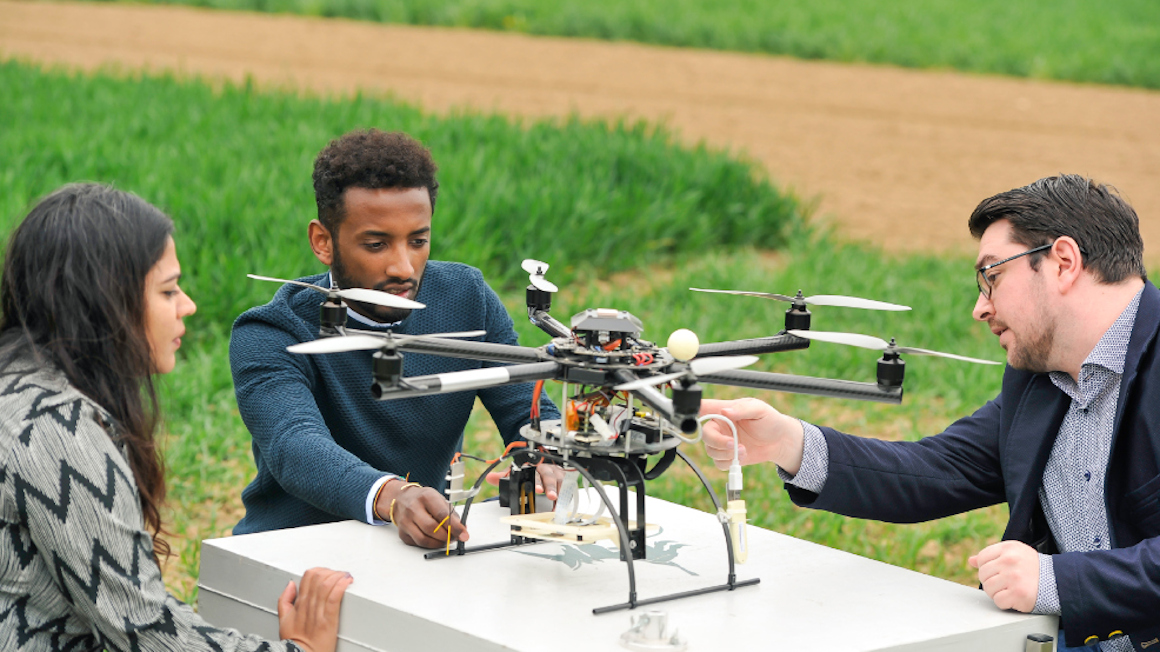Cultivation system without chemical crop protection shows its potential
Good yields and product quality can also be achieved in plant cultivation without the use of synthetic chemical pesticides. This is shown by field trials conducted by the NOcsPS research consortium.

Supplying a growing world population with affordable food is becoming increasingly difficult due to climate-related extremes such as heat, drought or heavy rainfall. But climate change is not the only factor jeopardising food security. According to studies, agricultural fertilisation practices are partly responsible for the fact that ecosystems such as the soil are over-fertilised and under pressure. New solutions are therefore needed for sustainable, resource-efficient and adaptable agricultural production.
As part of the ‘Agricultural Systems of the Future’ funding programme, the German Federal Ministry of Education and Research (BMBF) has been supporting the development of innovative agricultural systems such as the NOcsPS system since 2019. The joint project ‘More sustainable agriculture 4.0 without chemical-synthetic plant protection NOcsPS’, coordinated by the University of Hohenheim, aims to develop more sustainable cultivation systems without significantly impairing yield performance.
Combining the advantages of organic and conventional cultivation
‘The NOcsPS cultivation systems represent a complete reorientation in agricultural production. They attempt to combine the advantages of conventional and organic farming while minimising their respective disadvantages,’ explains research project spokesperson Enno Bahrs from the University of Hohenheim.
In concrete terms, this means that the NOcsPS system does not use chemical synthetic plant protection products (csPS), but does use mineral fertilisers. In addition to the University of Hohenheim, the Julius Kühn Institute (JKI) and the University of Göttingen are also involved in the project. The project is being funded by the BMBF with around 5.3 million euros.
As part of large-scale field trials at the University of Hohenheim in Baden-Württemberg and at the JKI in Dahnsdorf, Brandenburg, the researchers compared various NOcsPS cultivation systems with conventional and organic systems. The first promising results are now available: According to them, these cultivation systems actually have a high potential to make agriculture more resilient and sustainable.
New cultivation system achieves good yields
According to the researchers, NOcsPS systems produce lower yields than conventional methods. However, ‘good yields and product quality’ can also be achieved without synthetic chemical pesticides, they say. Above all, however, NOcsPS systems are more environmentally friendly and can promote biodiversity, as demonstrated by the diversity of insects, the researchers report.
Agricultural systems of the future at a glance
A new brochure, which bioökonomie.de has produced in cooperation with the stakeholders, provides information on the concepts, objectives and successes to date of the ‘Agricultural Systems of the Future’ funding programme.
Click here for the brochure (PDF download, only available in German)
For example, the NOcsPS yields of wheat in Dahnsdorf fell more sharply ‘due to the site conditions compared to conventional cultivation’. In Hohenheim, however, yields remained stable and ‘hardly differed from those in conventional cultivation’. ‘Among other things, the location ensures better water and nitrogen availability,’ explains Bahrs.
Compared to organic farming, which often struggles with nitrogen deficiency, wheat yields were higher in the NOcsPS system. A similar picture emerged for other cereal varieties such as spring barley, triticale (a cross between rye and wheat) and rye.
Effects of weed control with smart technologies
However, the situation was different for legumes. Soya beans and peas performed better in the NOcsPS system than in organic farming, but ‘recognisably worse than in the conventional systems’. According to the researchers, there were only no significant differences in maize yields between the new and conventional cultivation systems.
In addition to the targeted use of mineral fertilisers to supply nitrogen, the research team also used state-of-the-art digitalised technologies such as robotics, artificial intelligence and agricultural technologies based on biological principles in the field trial. For example, protein crops and catch crops were grown alongside cereals and maize.
Intelligent hoeing and harrowing technology was used to remove weeds. These smart technologies have the advantage of ‘differentiating between cultivated plants and unwanted vegetation’ and would therefore ‘also spare protected species or those that play a special role in preserving biodiversity’, it says.
Trial of the cultivation system is being extended
The economic aspects of the new cultivation system were also analysed. In the field trials, the yields achieved in the NOcsPS system were ‘between organic and conventional cultivation’. Following the initial positive results, the NOcsPS team plans to test the new cultivation system on more demanding crops such as rapeseed, sugar beet and potatoes.
bb


